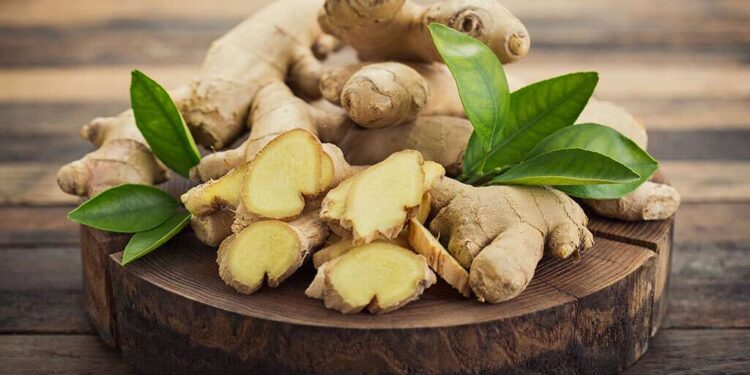People have used ginger in cooking and medicine since ancient times. It is a popular home remedy for nausea, stomach pain, and other health issues.
Apparently, ginger is a starring ingredient in many green juices for good reason.
While the ancient root has long been touted as a sick-day panacea in traditional Chinese and Ayurvedic medicine, the overall health benefits of ginger are wide-ranging. You can throw it in your smoothie, grate some on a stir fry, add it to soup, or sip ginger tea.
1. It can reduce pain
Ginger contains substances known as gingerols that quash inflammation and turn off pain-causing compounds in the body. But if you’re dealing with any kind of chronic pain, talk to your doctor about a long-term treatment plan, since it might be something a plant can’t fix.
2. It can heal irritated skin
If strong harmattan winds are doing a number on your skin, start healing from the inside out with ginger. Ginger’s anti-inflammatory properties help soothe red, irritated skin.
Ginger may play a role in weight loss, according to studies conducted in humans and animals. A 2019 literature review concluded that ginger supplementation significantly reduced body weight, the waist-hip ratio, and the hip ratio in people with overweight or obesity.
A 2016 study of 80 women with obesity found that ginger could also help reduce body mass index (BMI) and blood insulin levels. High blood insulin levels are associated with obesity. A 2019 literature review of functional foods also concluded that ginger had a very positive effect on obesity and weight loss.
The evidence in favor of ginger’s role in helping prevent obesity is stronger in animal studies. Rats and mice who consumed ginger water or ginger extract consistently saw decreases in their body weight, even in instances where they’d also been fed high fat diets.Ginger’s ability to influence weight loss may be related to certain mechanisms, such as its potential to help increase the number of calories burned or reduce inflammation.
3. It may help protect against cancer
While no single ingredient has the power to ward off serious disease, ginger does pack a pretty mean punch. Ginger is loaded with antioxidants that help protect the body from cancer, says Ansel.
4. It can help you look younger
You probably see the buzzword “antioxidant” splayed across your favorite expensive face creams but that’s actually for good reason. It’s promising (yet preliminary!) Research suggesting antioxidants help protect the skin from free-radicals (things in the environment like pollution and UV rays), which speed up the breakdown of collagen and damage the skin. Ginger’s antioxidant content can help maintain your skin’s collagen production, which promotes skin elasticity and smoothness.
5. It can help you digest quicker after a meal
Food babies are pretty uncomfortable, but thanks to ginger, they don’t have to last forever. A cup of ginger tea could help your stomach empty faster so food doesn’t just sit there after an indulgent meal, according to Christy Brissette, R.D., and president of 80 Twenty Nutrition. What’s more is that it’ll help calm your stomach and stave off bloating and gas.
6. It can reduce nausea
Why yes, you are pretty much nurse Florence Nightingale if you offer your hungover friend a can of ginger ale the morning after a fun night out. In general, ginger is a research-backed remedy for nausea, whether you’re dealing with a hangover, enduring a bumpy road trip, recovering from chemotherapy, or cursing pregnancy’s morning-sickness symptoms.
It may help relieve nausea and vomiting for people undergoing certain types of surgery. Ginger may also help chemotherapy-related nausea, but larger human studies are needed. However, it may be the most effective when it comes to pregnancy-related nausea, such as morning sickness. According to a review of 12 studies that included a total of 1,278 pregnant women, 1.1–1.5 grams of ginger can significantly reduce symptoms of nausea.
However, this review concluded that ginger had no effect on vomiting episodes. Although ginger is considered safe, talk with your doctor before taking large amounts if you’re pregnant.
It’s recommended that pregnant women who are close to labor or who’ve had miscarriages avoid ginger. Ginger is contraindicated with a history of vaginal bleeding and clotting disorders as well.
7. It can reduce bad cholesterol
Ginger can help lower LDL cholesterol levels (the bad kind!), reducing your risk of heart disease. A small recent study affirmed these findings, demonstrating that control groups who consumed three grams of ginger (that’s about half a teaspoon) three times a day experienced a significantly higher reduction in triglyceride and cholesterol than the placebo group.
8. It can ward off cardiovascular disease
Ginger’s blood-thinning properties could help prevent the formation of blood clots, reducing your risk of heart and stroke. Brissette warns that if you already take blood-thinning medications, check with your doctor before including more ginger in your diet.
9. It can help boost immunity
Why do people live on ginger lozenges when they’re sick? Those same gingerols that fight inflammation also have antimicrobial and antifungal properties to help fight infections and boost your immunity.
10. It can ease period cramps
If you find yourself clutching your abdomen in pain every month, you might want to try an ibuprofen alternative, ginger is one of the best natural forms of medicine as It helps with so many inflammatory processes.




































